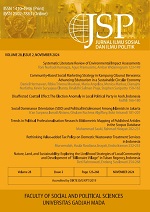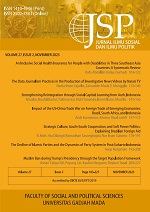Formulation of Innovation Policy: Case of Bandung Smart City
Chaereyranba Sholeh(1*), Sintaningrum Sintaningrum(2), Yogi Suprayogi Sugandi(3)
(1) Department of Public Administration, Faculty of Social and Political Sciences, Universitas Padjadjaran
(2) Department of Public Administration, Faculty of Social and Political Sciences, Universitas Padjadjaran
(3) Department of Public Administration, Faculty of Social and Political Sciences, Universitas Padjadjaran
(*) Corresponding Author
Abstract
The aim of this study is to describe the policy innovation of the implementation of a smart city in Bandung. Heightening urban issues are becoming increasingly complex and limited resources are available to alleviate them, making the government to continue making policy innovations in order to improve the societal welfare. The smart city policy innovation implemented by the government of Bandung is expected to solve the priority problems of Bandung effectively and efficiently. In conducting a policy innovation, special attention should be paid to several important things such as regulation, community needs, and understanding the apparatus and those who contribute in the implementation of a smart city in Bandung. With the fulfillment of several policy innovation factors, the implementation of a smart city in Bandung can be successful and solve the problems that currently exist in the city. To analyze the smart city policy innovation in Bandung, the researchers used the policy innovation instrument phase from Susanna Borras and Charles Edquist. The method used in this research is a qualitative method with a descriptive analysis method, and data collection was carried out through literature and field study (observation, interview, and documentation). The result of this research is that the smart city policy innovation in Bandung has not been successfully implemented. This can be seen from the three instruments of policy innovation that have not been implemented in the implementation of a smart city in Bandung. The three instruments are a regulation instrument, an economic financial instrument, and a soft instrument.
Keywords
Full Text:
PDFReferences
Angelidou, M. (2014). Smart city policies : A spatial aproach. Elsevier: CIties, 41, S3-S11.
Badan Perencanaan Pembangunan Daerah Kota Bandung. (2013). Masterplan teknologi informasi dan komunikasi Kota Bandung tahun 2013 - 2018. Bandung: Badan Perencanaan dan Pembangunan Kota Bandung.
Borras, S., & Edquist, C. (2013). The choice of innovation policy instruments. Technological Forecasting & Social Change, 80(8), 1-10. doi: 10.1016/j.techfore.2013.03.002
Bupati Bandung. (2014). Peraturan daerah kabupaten bandung nomor 3 tahun 2014 tentang perubahan keenam atas peraturan daerah Kabupaten Bandung nomor 23 tahun 2007 tentang pembentukan dana cadangan untuk pembebasan lahan untuk pembangunan jalan. Soreang.
Caragliu, Bo, C. D., & Nijkamp, P. (2009). Smart cities in Europe. Business administration and econometrics, Series: Serie Research Memoranda.
Cohen, B. (2013). What exactly a smart city?. Retrieved January 12, 2017, from http://www.boydcohen.com/smartcities.html
Dirintis sejak 2014, Pemkot Bandung kini punya 394 aplikasi smart city. (2017, September 26). Pikiran Rakyat. Retrieved from Pikiran Rakyat: http://www.pikiran-rakyat.com/bandung-raya/2017/09/26/dirintis-sejak-2014-pemkot-bandung-kini-punya-394-aplikasi-smart-city-410270
Diskominfo Kota Bandung. (2016). Fenomena Bandung smart city. Bandung: Diskominfo Kota Bandung.
Edler, J., & Fagerberg, J. (2017). Innovation policy: what, why, and how. Oxford Review of Economic Policy, 33(1), 2-23.
Edquist, C. (2001). The Systems of innovation approach and innovation policy: An account of the state of the art. Paper presented at DRUID Conference. Denmark: Aalborg.
Edquist, C. (2011). Design of innovation policy through diagnostic analysis: identification of systemic problems (or failures). Industrial and Corporate Change, 20(6), 1725-1753. doi: 10.1093/icc/dtr060
Ezell, S. J., & Atkinson, R. D. (2010). The good, the bad, and the ugly (and the self-destructive) of innovation policy: A policymaker’s guide to crafting effective innovation policy. Washington D.C: The Information Technology & Innovation Foundation.
Johansson, B., Karlsson, C., & Backman, M. (2007). Innovation policy instrument. Jonkoping, Sweden: CESIS .
Ramadhani, D. (2016, September 2). Ridwan Kamil: Dengan "Smart City", 70 persen masalah di Bandung Tuntas. kompas.com. Retrieved from http://regional.kompas.com/read/2016/09/02/14122821/ridwan.kamil.dengan.smart.city.70.persen.masalah.di.bandung.tuntas
LAPI ITB. (2013). Laporan akhir penyusunan rencana induk Bandung kota cerdas smart city . Bandung: Badan Perencanaan dan Pembangunan Pemerintah Kota Bandung.
Li, F., Butel, L., & Wang, P. (2017). Innovation policy configuration – a comparative study of Russia and China. Policy Studies, 1-28. doi: 10.1080/01442872.2017.1308477
Mickwitz, P., Hyva¨ttinen, H., & Kivimaa, P. (2008). The role of policy instruments in the innovation and diffusion of environmentally friendlier technologies: popular claims versus case study experiences. Journal of Cleaner Production, 162-170.
Monfaredzadeh, T., & Berardi, U. (2015). Beneath the smart city: dichotomy between sustainability and competitiveness. International Journal of Sustainable Building Technology and Urban Development, 140-156. doi: 10.1080/2093761X.2015.1057875
Mursalim, S. W. (2017). Implementasi kebijakan smart city di Kota Bandung. Jurnal Ilmu Administrasi, 126-138.
OECD. (2017). Fostering innovation in the public sector. Paris: OECD Publishing.
Petersen, K. (2008). Systematic mapping studies in software engineering. In G. Visaggio, M.T. Baldassarre, S. Linkman, & M. Turner (pp. 1-10). 12th International Conference on Evaluation and Assessment in software engineering. Italy: University of Bari.
Presiden Republik Indonesia. (2014). Undang undang Republik Indonesia nomor 23 tahun 2004 tentang pemerintah daerah. Jakarta: Presiden Republik Indonesia
Presiden Republik Indonesia. (2007). Peraturan pemerintah Republik Indonesia nomor 38 tahun 2007 tentang pembagian urusan pemerintahan antara pemerintah, pemerintah daerah provinsi, dan pemerintah daerah Kabupaten/Kota. Jakarta.
Snow, C. C., Hakonsson, D. D., & Obel, B. (2016). A smart city is a collaborative community: Lessons from smart aarhus. California Management Review, 59(1), 92-108.
Sunindyo, W. D., Akbar, S., & Iqbal, M. (2013). Towards a smart world class city case: Building Bandung ICT master plan. International Conference on ICT for Smart Society (pp. 1-5). Jakarta: IEEE Xplore.
Taewoon, N., & Pardo, T. (2011). Smart city as urban innovation: Focusing on management,policy and context. Proceedings of the 5th International Conference on Theory and Practice of Electronic Governance. (pp. 185-194). U. S., State University of New York: Center for Technology in Government University at Albany.
Mengapa jalan di Bandung selalu macet, kata pejabat Pemkot Bandung jawabannya ini. (2017, July 18). Tribun Jabar. Retrieved from http://jabar.tribunnews.com/2017/07/18/mengapa-jalan-di-bandung-selalu-macet-kata-pejabat-pemkot-bandung-penyebabnya-ini
Tyran, Jean-Robert, & Sausgruber, R. (2003). The diffusion of policy innovation: An experimental investigation. Departmen of Economics, Universitat St Gallen.
Utomo, T. W. (2016, January 23). Inovasi sebagai keniscayaan baru dalam ilmu dan praktek administrasi publik di Indonesia. Speech presented at Wisuda Sarjana ke-9 dan Magister ke-1 Sekolah Tinggi Ilmu Administrasi (STIA) in Indonesia, Bandung.
World Bank. (2010). Innovation policy: A guide for developing countries. Retrieved from https://openknowledge.worldbank.org/handle/10986/2460.
180 kegiatan Kota Bandung pakai dana CSR Rp 32 miliar. (2016, Desember 16). Pikiran Rakyat. Retrieved from http://www.pikiran-rakyat.com/bandung-raya/2016/12/16/180-kegiatan-kota-bandung-pakai-dana-csr-rp-32-miliar-388006
Article Metrics
Refbacks
- There are currently no refbacks.
Copyright (c) 2019 Jurnal Ilmu Sosial dan Ilmu Politik

This work is licensed under a Creative Commons Attribution-NonCommercial-NoDerivatives 4.0 International License.























